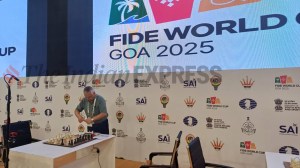Pak has to create right atmosphere for talks — India
NEW DELHI, MARCH 22: India on Wednesday asserted that Pakistan has to create the right atmosphere by stopping cross-border terrorism and h...

NEW DELHI, MARCH 22: India on Wednesday asserted that Pakistan has to create the right atmosphere by stopping cross-border terrorism and hostile propaganda against it for resumption of "productive and meaningful dialogue".
"India has been the initiator of the dialogue" which was reflected by Prime Minister Atal Behari Vajpayee’s visit to Lahore in February last year, an External Affairs Ministry spokesman said while replying to questions on remarks by US President Bill Clinton and Secretary of State Madeleine Albright on the Kashmir issue.
"India is ready for a dialogue but a right environment has to be created for that by Pakistan through cessation of cross-border terrorism and hostile propaganda," he said. Asked whether Clinton had offered US assistance in resolving the Kashmir issue in a speech to members of Parliament on Wednesday, the spokesman said the US President has made it clear that he had not come to South Asia to mediate on the Kashmir issue.
He contended that the reference to American diplomacy should be viewed in the context of bilateral exchanges between US and Pakistan when the then Prime Minister Nawaz Sharif had been told by Clinton in Washington last July to pull back Pakistani intruders from Kargil.
The spokesman said Clinton’s talks with the Indian leadership had reflected convergence of interests, convergence of concepts in some areas and on some other issues like cross-border terrorism the US President had been "very responsive" to New Delhi’s sentiments. He said Albright had a meeting with External Affairs Minister Jaswant Singh on Wednesday morning to take forward the decisions taken at the Clinton-Vajpayee talks.
The US Secretary of State invited Singh to visit Washington to begin the process of annual dialogue. Dates for the visit would be worked out through diplomatic channels, he said. During the 50-minute meeting, the two leaders also discussed the May 26-27 meeting of the Community of Nations in Warsaw where they would meet again.
They discussed in greater detail some of the issues including how India and the US would continue to remain engaged in promoting bilateral ties as envisaged in the Vision Document signed by Clinton and Vajpayee here on Tuesday. Singh also held a separate meeting with US Deputy Secretary of State Strobe Talbott with whom he has held 10 rounds of talks on non-proliferation issues since the Pokhran nuclear tests in May, 1998. Singh and Talbott took the opportunity to discuss the proposed `Dialogue Architecture’ and how it would unfold in the coming months.
National Security Adviser Brajesh Mishra met his US counterpart Sandy Berger on Tuesday while Commerce Secretary William Daley held intensive discussions with Industry and Commerce Minister Murasoli Maran. Responding to questions, the spokesman pointed out that at the time Sharif visited Washington in July last year, the Indian forces had already pushed back 80 to 90 per cent of Pakistani intruders from the Indian side of LoC in Kargil.





- 01
- 02
- 03
- 04
- 05


























